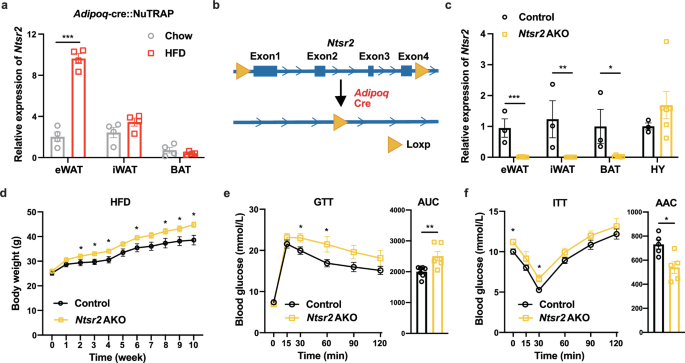Neurotensin-neurotensin receptor 2 signaling in adipocytes suppresses food intake through regulating ceramide metabolism
IF 25.9
1区 生物学
Q1 CELL BIOLOGY
引用次数: 0
Abstract
Neurotensin (NTS) is a secretory peptide produced by lymphatic endothelial cells. Our previous study revealed that NTS suppressed the activity of brown adipose tissue via interactions with NTSR2. In the current study, we found that the depletion of Ntsr2 in white adipocytes upregulated food intake, while the local treatment of NTS suppressed food intake. Our mechanistic study revealed that suppression of NTS-NTSR2 signaling enhanced the phosphorylation of ceramide synthetase 2, increased the abundance of its products ceramides C20–C24, and downregulated the production of GDF15 in white adipose tissues, which was responsible for the elevation of food intake. We discovered a potential causal and positive correlation between serum C20–C24 ceramide levels and human food intake in four populations with different ages and ethnic backgrounds. Together, our study shows that NTS-NTSR2 signaling in white adipocytes can regulate food intake via its direct control of lipid metabolism and production of GDF15. The ceramides C20–C24 are key factors regulating food intake in mammals.


神经紧张素-脂肪细胞中的神经紧张素受体2信号通过调节神经酰胺代谢来抑制食物摄入
神经紧张素(NTS)是淋巴内皮细胞产生的一种分泌肽。我们之前的研究表明,NTS通过与NTSR2的相互作用抑制棕色脂肪组织的活性。在目前的研究中,我们发现白色脂肪细胞中Ntsr2的缺失上调了食物摄入,而NTS的局部处理抑制了食物摄入。我们的机制研究表明,NTS-NTSR2信号的抑制增强了神经酰胺合成酶2的磷酸化,增加了其产物神经酰胺C20-C24的丰度,并下调了白色脂肪组织中GDF15的产生,这是导致食物摄入量升高的原因。我们在四个不同年龄和种族背景的人群中发现血清C20-C24神经酰胺水平与人类食物摄入量之间存在潜在的因果关系和正相关。总之,我们的研究表明,白色脂肪细胞中的NTS-NTSR2信号可以通过直接控制脂质代谢和GDF15的产生来调节食物摄入。神经酰胺C20-C24是调节哺乳动物食物摄入的关键因子。
本文章由计算机程序翻译,如有差异,请以英文原文为准。
求助全文
约1分钟内获得全文
求助全文
来源期刊

Cell Research
生物-细胞生物学
CiteScore
53.90
自引率
0.70%
发文量
2420
审稿时长
2.3 months
期刊介绍:
Cell Research (CR) is an international journal published by Springer Nature in partnership with the Center for Excellence in Molecular Cell Science, Chinese Academy of Sciences (CAS). It focuses on publishing original research articles and reviews in various areas of life sciences, particularly those related to molecular and cell biology. The journal covers a broad range of topics including cell growth, differentiation, and apoptosis; signal transduction; stem cell biology and development; chromatin, epigenetics, and transcription; RNA biology; structural and molecular biology; cancer biology and metabolism; immunity and molecular pathogenesis; molecular and cellular neuroscience; plant molecular and cell biology; and omics, system biology, and synthetic biology. CR is recognized as China's best international journal in life sciences and is part of Springer Nature's prestigious family of Molecular Cell Biology journals.
 求助内容:
求助内容: 应助结果提醒方式:
应助结果提醒方式:


